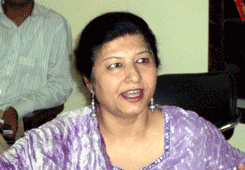To muddle through all the problems like terrorism, radicalization, poverty and energy crisis that Pakistan is currently facing requires a policy shift,” noted Dr. Shaheen, a research fellow at the Institute for Regional Studies Islamabad (IRS), while addressing a session organized by Pak Institute for Peace Studies (PIPS) Islamabad on September 29, 2009 at its premises.
While recounting the factors of extremism in Pakistan, Dr. Shaheen, recommended strategies to counter terrorism and extremism in Pakistan keeping in view regional and international circumstances.
According to her the Soviet invasion of Afghanistan is the most crucial event that continues to have far reaching implications for the region. In 1989 when the Soviet forces withdrew from Afghanistan, leaving the destiny of the state in the hands of jihadi groups. The transition period between the Soviet withdrawal from Afghanistan and the US invasion in 2001, the jihadis established a strong jihadi culture in Afghanistan and the tribal areas of Pakistan. The alleged US invasion of Afghanistan in 2001, converted the tribal areas of Pakistan into save havens for the terrorists fleeing Afghanistan. She said, “The recent shift in war on terror from Afghanistan to Pakistan ever since President Obama took over as the President of US has only added to the trials and tribulations for Pakistan.”
Focusing on the regional factors that made Pakistan more attractive for the extremists she said one major cause of extremism is the ongoing conflict between Pakistan-India on Kashmir. She said the wave of terrorism that originated from Kashmir finally reached in Pakistan. The culture of terrorism flourished in Pakistan as the freedom fighters were trained in the Pakistan.
Quoting a number of incidents like 2001-02 military stand off, the Mumbai attacks, not only strained the relations of the two neighbors but India backed by the international community also pressurized Pakistan to ban the militant organizations like Lashkar-e-Tayyab (LeT) and Jaish-e-Muhamamd (JeM).
 Dr. Shaheen maintained that for the long lasting peace, efforts are required at the national, regional and international level. At the national levels, a policy shift is needed from individual state level responsibility approach to collective responsibility approach. The holistic approach includes the development in all sectors and de-radicalization of Pakistani Society.
Dr. Shaheen maintained that for the long lasting peace, efforts are required at the national, regional and international level. At the national levels, a policy shift is needed from individual state level responsibility approach to collective responsibility approach. The holistic approach includes the development in all sectors and de-radicalization of Pakistani Society.
On the regional and international level, she emphasized the need to make Joint Anti Terrorism Mechanism (JATM) a robust and effective channel between India and Pakistan to fight terrorism. She also proposed active cooperation between Iran, Pakistan and Afghanistan in the form of a joint force to fight terrorism in the region. In order to create peace between India and Pakistan she stressed the need to revive composite dialogue and back channel diplomacy between the two countries.

